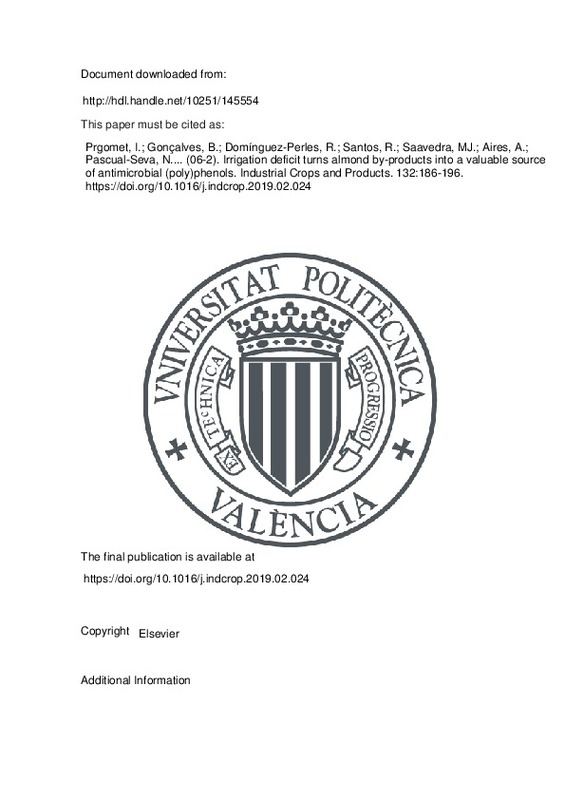JavaScript is disabled for your browser. Some features of this site may not work without it.
Buscar en RiuNet
Listar
Mi cuenta
Estadísticas
Ayuda RiuNet
Admin. UPV
Irrigation deficit turns almond by-products into a valuable source of antimicrobial (poly)phenols
Mostrar el registro sencillo del ítem
Ficheros en el ítem
| dc.contributor.author | Prgomet, I.
|
es_ES |
| dc.contributor.author | Gonçalves, B.
|
es_ES |
| dc.contributor.author | Domínguez-Perles, R.
|
es_ES |
| dc.contributor.author | Santos, Rafaela
|
es_ES |
| dc.contributor.author | Saavedra, Maria José
|
es_ES |
| dc.contributor.author | Aires, Alfredo
|
es_ES |
| dc.contributor.author | Pascual-Seva, Nuria
|
es_ES |
| dc.contributor.author | Barros, Ana
|
es_ES |
| dc.date.accessioned | 2020-06-06T03:32:54Z | |
| dc.date.available | 2020-06-06T03:32:54Z | |
| dc.date.issued | 2019-06 | es_ES |
| dc.identifier.issn | 0926-6690 | es_ES |
| dc.identifier.uri | http://hdl.handle.net/10251/145554 | |
| dc.description.abstract | [EN] Almond (Prunus dulcis (Mill.) D. A. Webb) production keeps an increasing trend worldwide, leading to augment in generation of harmful by-products that should be valorized as a source of bioactive phytochemicals with application in the development of new added-value products. The assessment of almond hulls and skins on their (poly)phenolic composition was developed upon two seasons, under five irrigation regimes, regarding total phenolics, flavonoids, and ortho-diphenols, as well as individual phenolic compounds analyzed by High Performance Liquid Chromatography with Diode-Array Detection (HPLC-DAD). As functional tests, extracts were assessed on their radical scavenging activity in vitro and reducing power, and screened on their antimicrobial activity against multidrug resistant bacterial pathogens. The phenolic profile and antioxidant activities were evaluated in blanching water as well. Naringenin-7-O-glucoside and isorhamnetin-3-O-rutinoside were the most abundant phenolics in almond hulls and skins. Influence of irrigation treatments and season on phenolic content differed among by-products; hulls being more influenced by irrigation and skins by the agro-climatic conditions. The synthesis of individual phenolics was more influenced by season than treatment. According to the chemical and biological correlations, the presence of (poly)phenols seems to be responsible for the antioxidant and antimicrobial properties revealed. The knowledge generated upon the present work contributes to understand the variability of almond by-products composition attributable to seasonal and irrigation conditions, and to envisage valorization alternatives for these under explored residues and blanching water. | es_ES |
| dc.description.sponsorship | IP acknowledges the financial support provided by the FCT-Portuguese Foundation for Science and Technology (SFRH/BD/52539/2014), under the Doctoral Programme Agricultural Production Chains from fork to farm (PD/00122/2012). This work was also supported by National Funds by FCT - Portuguese Foundation for Science and Technology, under the project UID/AGR/04033/2019. RDP was supported by a Postdoctoral Contract (Juan de la Cierva de Incorporación ICJI-2015-25373) from the Ministry of Economy, Industry and Competitiveness of Spain. | es_ES |
| dc.language | Inglés | es_ES |
| dc.publisher | Elsevier | es_ES |
| dc.relation.ispartof | Industrial Crops and Products | es_ES |
| dc.rights | Reserva de todos los derechos | es_ES |
| dc.subject | Almond residues | es_ES |
| dc.subject | Seasonal and irrigation variability | es_ES |
| dc.subject | Phenolic compounds | es_ES |
| dc.subject | Radical scavenging | es_ES |
| dc.subject | Reducing power | es_ES |
| dc.subject | Antibacterial potential | es_ES |
| dc.subject.classification | PRODUCCION VEGETAL | es_ES |
| dc.title | Irrigation deficit turns almond by-products into a valuable source of antimicrobial (poly)phenols | es_ES |
| dc.type | Artículo | es_ES |
| dc.identifier.doi | 10.1016/j.indcrop.2019.02.024 | es_ES |
| dc.relation.projectID | info:eu-repo/grantAgreement/MINECO//IJCI-2015-25373/ES/IJCI-2015-25373/ | es_ES |
| dc.relation.projectID | info:eu-repo/grantAgreement/FCT/SFRH/SFRH%2FBD%2F52539%2F2014/PT/ | |
| dc.relation.projectID | info:eu-repo/grantAgreement/FCT/PD/PD%2F00122%2F2012/PT/ | |
| dc.relation.projectID | info:eu-repo/grantAgreement/FCT//PD%2F00122%2F2012/ | es_ES |
| dc.relation.projectID | info:eu-repo/grantAgreement/FCT/5876/147341/PT/Centre for the Research and Technology of Agro-Environmental and Biological Sciences/ | |
| dc.relation.projectID | info:eu-repo/grantAgreement/FCT//UID%2FAGR%2F04033%2F2019/ | es_ES |
| dc.rights.accessRights | Abierto | es_ES |
| dc.contributor.affiliation | Universitat Politècnica de València. Departamento de Producción Vegetal - Departament de Producció Vegetal | es_ES |
| dc.description.bibliographicCitation | Prgomet, I.; Gonçalves, B.; Domínguez-Perles, R.; Santos, R.; Saavedra, MJ.; Aires, A.; Pascual-Seva, N.... (2019). Irrigation deficit turns almond by-products into a valuable source of antimicrobial (poly)phenols. Industrial Crops and Products. 132:186-196. https://doi.org/10.1016/j.indcrop.2019.02.024 | es_ES |
| dc.description.accrualMethod | S | es_ES |
| dc.relation.publisherversion | https://doi.org/10.1016/j.indcrop.2019.02.024 | es_ES |
| dc.description.upvformatpinicio | 186 | es_ES |
| dc.description.upvformatpfin | 196 | es_ES |
| dc.type.version | info:eu-repo/semantics/publishedVersion | es_ES |
| dc.description.volume | 132 | es_ES |
| dc.relation.pasarela | S\380510 | es_ES |
| dc.contributor.funder | Ministerio de Ciencia e Innovación | es_ES |
| dc.contributor.funder | Fundação para a Ciência e a Tecnologia, Portugal | es_ES |







![[Cerrado]](/themes/UPV/images/candado.png)

